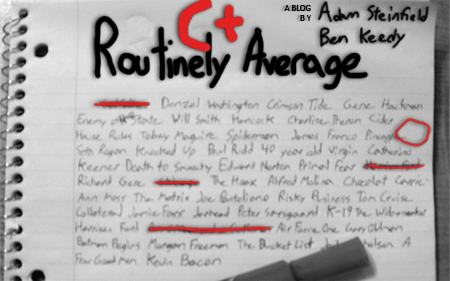So when I started this blog, I meant to have a fairly even mix of the old and the new. Recently we have been on a new release or in theater binge, so to switch things up, I thought I would review one of my all-time favorite movies... Sidney Lumet's first-ever film, the 1957 drama 12 Angry Men.
The film opens in a court house on a hot night, right before the jury deliberates on a murder trial. As you may have guessed from the title, it revolves around the twelve members of the jury. An all middle aged or older, all-male, all-white, all-middle class or up jury is about to decide on the fate of an 18 year-old boy who is clearly not white and not middle class. He is accused of stabbing his father to death and if found guilty, must be sent to the chair. After the judge reads the jury their instructions, the movie moves into the jury room and stays there for essentially the remainder of the film. Once inside, we quickly discover that the vast majority firmly believe the boy is guilty. One man, however, has his doubts.
The cast is spectacular. All twelve members of the jury are given ample dialogue and screen time to create full fledged characters, and the actors do not disappoint. None of them are cardboard cutouts. We are reminded many times over the course of the movie that these are all ordinary people with their own lives and experiences that they are bringing to bear on the evidence, and how that causes each of them to have their own unique viewpoint.
Henry Fonda as the lone dissenter, Juror #8, is terrific and brings a great deal of intelligence to the role. Lee J Cobb is equally charismatic as the "excitable" nemesis to Fonda, Juror #3. E.G. Marshall's coldly logical Juror #4 and Ed Begley's racist Juror #10 both deserve mention.
The filming of this movie would seemingly be simple. Sidney Lumet, making his first feature film, displays the ability he would show several times later on in his career as he places the viewer inside the jury room. While the film progresses, Lumet changes angles and uses close-ups to great effect, slowly constricting the room and increasing our claustrophobia. It is a masterful debut.
12 Angry Men is a simultaneously optimistic and pessimistic view of the American judicial system. It extolls all its virtues (including the idea of reasonable doubt), and it appears to be praising the ability of twelve ordinary people to come to a consensus. Unspoken however, are grave concerns. Racism is an ever present danger, and a jury is just a likely to have a Lee J Cobb as it is to have a Henry Fonda.
A must see.
27/30



Love this movie. Great write up.
ReplyDeleteI think this was one of the first movies that really showed me how great dialog and acting can make a movie just as tense as action can (it can do an even better job, really). It blew my mind as a young'un that I was riveted by the film and yet we never leave the jury room (spoiler!) until the very last scene.
I especially like Juror #4. I think it's rare you see a character like him in cinema, who will change his viewpoint if you present him enough doubt to do so. Great job writing that character. He is very refreshing.
Before re-watching this recently, I saw Before The Devil Knows You're Dead, also by Lumet. Very different films, but what a neat career he has had.
I'd give this a 28 or 29.
Also, I like your last paragraph. What if Henry Fonda hadn't been in the room? I wonder how often verdicts are obtained by people just wanting to get out of there.
ReplyDeleteSPOILERS!!
ReplyDeletedude I totally agree. Juror #4 is one of the most unusual characters I've ever seen. Holds no grudges, is never prejudiced, stands by his opinion, but only until enough evidence is prevented to change his mind. A really remarkable character. He is the real opposition to Fonda. I love the scene when he starts to turn them back, and Fonda has no answer.
And as for your last point, I often think about that when I watch this movie. What if Henry isn't there? I think of all the people on that jury, he is the most rare... but maybe that is just me being pessimistic.
Also (more spoilers) I think the scene where Fonda nabs Cobb on his racism and the people slowly ignore him is one of the great scenes of all time.
ReplyDeleteWait, that scene doesn't actually have to do with racism, does it? He reveals his bias, at least. but anyway, of ALL TIME!!! kayne style.
ReplyDeleteWell you've mixed up your scenes slightly there. Its Ed Begley who goes on the big racist rant and people slowly move away from the table. But agreed! Great scene!
ReplyDeletecrap you've outed me in front of everyone
ReplyDeleteTensions are symbolically heating up here! Good thing it's starting to metaphorically rain, and everyone's tempers will soon figuratively cool down.
ReplyDeleteYou can't really fault them for it, because it is really remarkable that such a gripping film can be so damn minimalist, but you gotta admit, what few poetic touches they did add end up looking a little contrived in the face of the bare set and straightforward dailogue-based plot (the rain at half-time; the number of people tipping the scale of justice; the color of the jackets).
Oh what the hell am I talking about, I love all that shit!
I haven't seen this film in ages - thanks for reminding me I need to see it again. (FYI: Twelve Angry Men was originally a television play, then made into the 1957 film.)
ReplyDelete